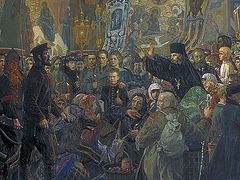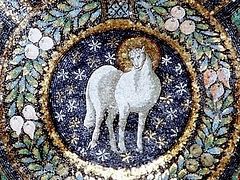St. Peter once offered his new Gentile converts some advice about the task of being in the world while not being of the world: “Beloved, I beseech you as aliens and strangers to avoid fleshly desires which wage war against the soul” (1 Peter 2:11). Note this last bit: he urges them to avoid worldly desires because they are no longer of the world, but live in it as “aliens and strangers”. Citizens of a country are expected to conform their country’s customs and norms, but aliens who come from another country and strangers who are merely visiting are not expected to fit in. They will live and behave differently from those around them.
That, St. Peter says, describes us Christians: planet earth, the society in which we live, is no longer our country, since our true citizenship is in heaven (Philippians 3:20)—or, in the words of Jesus People Larry Norman in 1972, we are “only visiting this planet”. We will therefore no longer fit into the secular society where we live. Fleshly desires are for those in the world, not for Christians who no longer belong to the world. Though we are in the world, sharing earthly citizenship with others in society, partaking of its voting rights and its patriotism, we are no longer of the world. The flags under which we stand and to which we may pledge earthly allegiance no longer ultimately define who we are. We are no longer fundamentally Americans, Canadians, Russians, or Scots, but Christians, and our true countrymen are those who share our faith in Christ, regardless of their colour and nationality, and regardless under which flag they stand. That is why St. Peter, later on in his epistle, tells his readers not to act like the Gentiles do (4:3), despite the fact that they were Gentiles. Or, more specifically, they used to be Gentiles. Now they were Gentiles no longer, and so should not act like them. Now they were a chosen race, a holy nation, the Church of the living God. It would be like writing to American Christians and telling them “Let the time that is past suffice for doing what the Americans like to do”. St. Paul says the same thing, mentioning the Church of God as a third category, separate from Jews and Gentiles (1 Corinthians 10:32).
This Biblical teaching finds an early echo in the letter of an early church father who wrote an open Letter to Diognetus sometime in the early second century. He described Christians like this: “They dwell in their countries, but simply as sojourners. As citizens they share in all things with others, and yet endure all things as if foreigners. Every foreign land is to them as their native country, and every land of their birth as a land of strangers.” In other words, Christians belong primarily to Christ and therefore to the age to come, not to any earthly nation. They live in this age simply as those who are passing through.
It is important to remember this basic Biblical truth, and not to become so invested in the political storms around us that we forget that the land in which we cast our votes and eat our bread is not really our native country. We may love our nation, but must not let it define us, and certainly not to the point of separating us from our true countrymen, the Christians who live in other countries and who share our faith. That would be to indulge the fleshly desires which St. Peter tells us to avoid, for by “fleshly desires” the apostle was not speaking only of sexual desires, or of gluttony. By “fleshly desires” he meant any appetite or consuming passion which grips and controls us—including the passion of anger, enmity, disputing, dissensions, and factions of which St. Paul warned us in Galatians 5:20—passions which often characterize those entangled in political turmoil. Politics is very interesting, but we must cast our votes with the knowledge that in the final conflagration at the Second Coming (2 Peter 3:10) all flags will burn, including our own. But that’s okay, for we did not wrap ourselves in any flag, but stood under a cross, and that cross is completely nonflammable.
The emphatic and consistent teaching of the New Testament is that we live in the last hour, so that the form of this world is passing away (1 John 2:18, 1 Corinthians 7:31). We must live in this age and in our society as those with a certain detachment—not the detachment of indifference, for we must still love our neighbour and seek to lift his burdens and meet his needs. Rather, we live with the detachment of those who know that they are already dead to this world, and that our true life is hidden with Christ in God (Colossians 3:3). Here in this world, for a while, we live, and love, and rejoice, and give thanks to God for the good things we find here, including good things that may characterize our nation. But our true native land is elsewhere, and our desire is to depart and be with Christ, and to finally come to our true home.





There is a sentiment attributed to the first Republican president, and the first murdered president, Abraham Lincoln, that our "Constitution is not a suicide pact". Similarly, I do not think we need to take our faith as a suicide pact either, especially on behalf of our nation.
Scripture ALSO admonishes us to be mindful of the laws & leaders of our lands. There is smarmy innuendo in this article that suggests we collaborate in assisting others in doing just that. Humbug.
But how embarrassing that Protestants are trying to do something about the kids ripped from there families and I’ve yet to hear a word at church. Or the rampant police brutality. i attend is full of wealthy members and nothing is done for the community. Long prayers for their home country and honoring their vets, but what a disconnect.
In my mind this article just makes it easier to remain disconnected.
As Americans or Western Europeans, it's easy to disregard a culture/nation that has become completely degraded and toxic, but I have a lot of respect for those in my own and other "ethnic parishes" who actually have something worth holding onto.